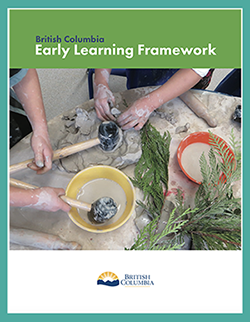Module 2: Rethinking Learning and Practice
Using Pedagogical Narration in Your Professional Practice
Case Study: Pedagogical Narration
The educators and children at Beecher Creek Elementary School went on a nature walk one frosty November morning. The children were interested in exploring the frost through touch and feel. They made “frost angels” on the grass. They found interesting sticks and a dead snake. The educator, while somewhat worried about the dead snake, was ready to explore it because the children were interested. The children asked questions about what happened to the snake. As they continued walking, one child noticed the moon was still in the sky, even though it was not night-time. The educators gathered traces of the children’s journey through photographs, noting conversations, and paying attention to the children’s interests. The educators wrote field notes about the ordinary moment, and shared it with the children. This sparked discussions and artwork about the children’s interests from their nature walk. The educators shared the narration and inspired artwork with other colleagues and with the children’s families.
Reflective Questions
In pedagogical narration, paying attention to the interests and the ordinary moments of the children is very important. Notice that the educators in this case study were led by the children’s interests, even when that interest was uncomfortable for the educators - involving a dead snake.
In your practice, how can you ensure that you are paying attention to children’s interests? How could you engage in the process of pedagogical narration?
